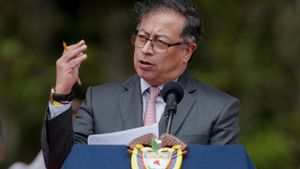Donald Trump's post-presidency phase has been anything but quiet as he ramps up actions focused on restructuring the federal workforce and addressing legislative priorities, as evidenced by two recent developments: his directive to terminate federal employees who do not align with his political vision and the signing of the Laken Riley Act aimed at tackling immigration-related crimes.
Known for his catchphrase "You're hired," Trump's transition back to the presidency has seen him adopt another motto, "You're fired," particularly focused on government officials he deems unsatisfactory. Trump has taken it upon himself to initiate significant changes within federal agencies, launching efforts to cleanse the federal workforce of those he perceives as disloyal or incompetent. Employees working for the federal government have recently received notices about the establishment of programs which provide buyouts for those who might not be excelling under the current administration.
"If you choose not to continue in your current role... you will be provided with a dignified, fair departure," states the memo from the Office of Personnel Management, setting a timeline through early February 2025. This move has stirred controversy among union leaders and federal employee advocates. Randy Erwin, the president of the National Federation of Federal Employees, has openly criticized Trump's approach, labeling it as intimidation of civil service workers. Erwin contends, "The White House creating a hitlist of 'disloyal' federal employees... threatens a foundational pillar of American democracy," emphasizing the potential for politically motivated retribution.
While Trump asserts the need for accountability within federal ranks, he insists his expectations do not require federal employees to politically support him. On this note, his official release mentions, "Employees... are required to faithfully implement administration policies to the best of their ability. Failure to do so is grounds for dismissal." This stance aims to tighten control and oversight, particularly following significant federal actions under the preceding Biden administration.
Simultaneously, Trump has been busy with legislative initiatives, prominently featuring the recent signing of the Laken Riley Act. Co-sponsored by freshman Republican Rep. Brian Jack from Georgia, the bill has been specially noted for its focus on immigration policy, reflecting Trump's longstanding priorities since his initial campaign launch. Jack, expressing his sentiments about the day, stated, "It was extreme relief for our country... extreme happiness for him having served by his side," capturing the emotional significance of the moment for both himself and Trump.
The Laken Riley Act stems from the tragic murder of Laken Riley by an illegal immigrant, underscoring the distress surrounding crimes committed by non-citizens. The legislation mandates the Department of Homeland Security to detain illegal immigrants committing specific crimes. Jack's initiative garnered notable bipartisan backing, capturing votes from 46 House Democrats and 12 Senate Democrats. This Ongoing cooperation sheds light on how immigration remains pivotal across party lines amid shifting sentiments among voters.
Behind the scenes, both Trump and Jack reflect on their shared history, tracing back to when Trump first caught the nation’s attention during the 2016 campaign. Jack served as national delegate director—building rapport with Trump as he transitioned through key roles during the president's first term, eventually reaching the position of political director. Their mutual respect remains apparent when Jack credits Trump's endorsement as pivotal to his success during the primary campaign against seasoned Republican Mike Dugan.
“I’m a member of Congress because of President Trump,” said Jack, reaffirming how Trump's influence resonates with voters. The endorsement he received proved incredibly powerful, establishing him as the third Trump campaign alumnus to secure election to the House. Jack's political ambition, fueled by the access and support from former President Trump, showcases the way Trump's legacy continues to manifest through his associates.
Among Trump's admirers and skeptics, Jack, like many, hopes the Laken Riley Act can pave the way for effective and responsible immigration reform. The thrill of signing such legislation marks not only triumph for Jack but also potential legislative momentum as Trump and his allies look toward future reforms aimed at moving federal agencies to locations aligned with their operational missions.
Trump's focus as he embarks on this period post-presidency has considerable ramifications not just for federal workers but for immigration policies across the board. Despite the pushback from some sectors, the ex-president's commitment to reshaping the federal government continues to resonate with his base as he navigates the renewed political waters, all the way to 2024 and beyond.



